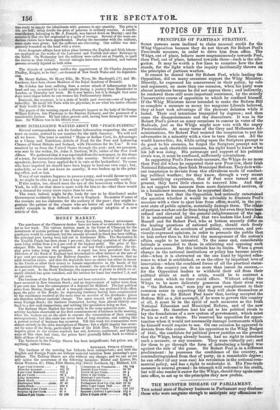TOPICS OF THE DAY.
PRINCIPLES OF PARTISAN STRATEGY.
SOME persons seem inclined to claim unusual credit for the Whig Opposition because they do not thwart Sir Robert Peel's Free-trade measure, in order to drive him from office. The Whigs, out of place, behave more magnanimously towards Peel, than Peel, out of place, behaved towards them—such is the alle- gation. It may be worth a few lines to examine how the fact stands, for the light which the inquiry incidentally throws on the principles of partisan warfare. It cannot be denied that Sir Robert Peel, while leading the Opposition, did on many occasions support the Whig Ministry. Directly, he expressed his concurrence in their policy, by vote and argument, on more than one occasion, when his party were almost mutinous because he did not oppose them ; and indirectly, he rendered them still more important assistance, by the strictly Conservative course of opposition to which he confined himself. If the Whig Ministers never intended to make the Reform Bill so complete a measure as many too sanguine Liberals believed, they at least took advantage of the pleasant delusion while it lasted. Their real intentions transpired by degrees ; and then came the disappointments and the discontents. It was in Sir Robert Peel's power on many occasions to concur in votes of the Radicals, just as the Whigs might now vote with the anggrryy Protectionists. At many turns of the Grey and Melbourne
Ad- ministrations, Sir Robert Peel resisted the temptation to put his adversaries in a minority with a view to turn them out. All the world knows this; for, while acting upon the Scripture precept to do good to his enemies, he forgot the Scripture precept not to allow, on such charitable occasions, his right hand to know what his left was doing. His patronage and support of his political rivals was, it must be confessed, sufficiently ostentatious. In supporting Peel's Free-trade measure, the Whigs do no more than Peel did when he supported their new Poor-law, their Irish National Education, their Irish Municipal Reform. They do it with- out temptation to deviate from this chivalrous mode of conduct- ing political 'warfare; for they know, through a very recent and mortifying experience, that if Peel were turned out at present, they have little chance to succeed him. And they do not support his measure from more disinterested motives, or in a handsomer manner, than he supported theirs.
The mere fact that ihe Opposition had seriously entertained the question whether it would be advisable to frustrate Peel's measure with a view to eject him from office, would, in the pre- sent state of public opinion, materially damage them. The ethies of partisan warfare are far from being rigid, but even they have been refined and elevated by the general enlightenment of the It is understood and allowed, that two leaders like Lord John Russell and Sir Robert Peel, who at bottom scarcely differ on the leading questions of national policy, should each freely avail himself of the accidents of position, connexions, and pre- viously-expressed opinions, in order to persuade the public that to him rather than to his rival the management of the nation's affairs ought to be intrusted. To the same end, considerable latitude is conceded to them in criticizing and opposing each other's measures. But this latitude has its limits. When a great change in the national institutions or policy has become inevit- able—when it is obstructed on the one hand by bigoted adhe- rence to what is established, or on the other by impatient love of innovation—when the combined forces of all the practical states- men in the country can do no more than insure its success,— for the Opposition leaders to withhold their aid from their political rivals at such a crisis, would be to contract a moral stain which no time could efface. Without asking the Whigs to be more delicately generous than their rival was in " the Reform sera," men pay no great compliment to their common sense in expecting that they will show themselves at least as wise. Sir Robert Peel knew that, having accepted the Reform Bill as a fait accompli, if he were to govern this country at all, it must be in the spirit of such measures as the Irish National Education and Municipal Reform, and of the new Poor-law. He therefore lent his aid to his political rivals to lay the foundations of a new system of government, which must be his as well as theirs. He reserved his opposition for oppor- tunities when it would not necessarily damage instruments which he himself would require to use. On one occasion he appeared to deviate from this course. But his opposition to the Whig Budget of 1841, the candidate for political power justifies on the ground that the Whigs, being already beaten, had no right to introduce such a measure, or any measure. They were virtually out; and for them to go through the form of introducing a budget was against the rule of the game. Sir Robert Peel is in kdifferent predicament : he possesses the confidence of the country, as contradistinguished from that of party, in a remarkable degree ; he can effect (if any man can) his revolution in the national com- mercial policy, and has a right to undertake it. His Free-trade measure is neutral ground : its triumph will redound to his credit, but will also render it easier for the Whigs, should they again come into office, to act up to the principles they now profess.


























 Previous page
Previous page